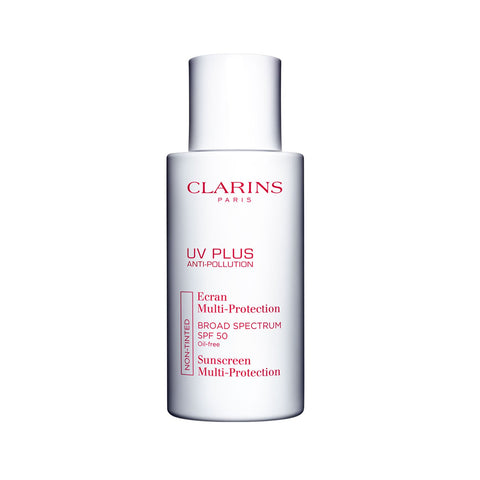Now that we’re heading into summer, it’s time to get yourself educated about proper sun protection and all of the ways it can help your skin. Naturally, you’ve probably heard that it’s important to wear some type of sunscreen on your face every single day--even in the winter or on days when you’re not planning to spend much time outside.
Here’s why: wearing sunscreen every day can do a lot more than just protect your skin (hint: if you’re wondering how to get clear skin, this can help!). Sunscreen helps reduce redness and irritation to the skin caused by sun exposure. So if you’ve got a breakout, one of the best things to do is cover it up in the morning with some good ol’ UV protection. Sunscreen can also keep your skin from aging prematurely, as sun damage is one of the biggest factors contributing to the development of fine lines & wrinkles.
Sun protection is just as, if not more, important than staying hydrated—because what good is hydrated skin if it’s getting sun damaged? Here’s the thing, though, there’s a lot of sunscreen products out there to choose from, and some people try to tell you that one is infinitely better than the other because it is “natural” or “mineral.” But how do you really know which is best? And not just best, but best for you? The key here is understanding what the two are, and how the differences can help different skin types.
“Natural” Sunscreens
When people refer to natural sunscreens what they’re really referring to is mineral sunscreens. Mineral sunscreens are products that utilize natural minerals to deflect UVA/B rays from the sun, rather than absorbing them. These minerals are usually some form of zinc or titanium oxide which are processed in a lab before being turned into cosmeceutical SPFs. Although they’re technically ‘natural’ ingredients, they don’t qualify under the ‘organic’ label.
Not only do minerals protect against the sun, but they often have a whole other set of benefits that make them great for your skin care routine. When shopping for a mineral sunscreen make sure to find one that contains coated minerals. This means that the ingredients have been stabilized and will be safer to use on the skin.
 One of our favorite natural sunscreens is from Elta MD, a dermatologist approved line of suncare. EltaMD’s UV Physical Broad-Spectrum SPF 41 is an amazing tinted sunscreen. Formulated for extra-sensitive skin types and recommended for post procedure, this gentle formula is fragrance-free, oil-free, paraben-free, sensitivity-free, chemical-free, and noncomedogenic.
One of our favorite natural sunscreens is from Elta MD, a dermatologist approved line of suncare. EltaMD’s UV Physical Broad-Spectrum SPF 41 is an amazing tinted sunscreen. Formulated for extra-sensitive skin types and recommended for post procedure, this gentle formula is fragrance-free, oil-free, paraben-free, sensitivity-free, chemical-free, and noncomedogenic.
Moreover, the UV Physical Broad-Spectrum is an oil-free sunscreen featuring an extra boost of antioxidants to neutralize free radicals. So you can use it by itself or under makeup any day of the week! You can even wear it to the beach or pool this summer because its water resistant formula withstands water, humidity, and perspiration. We always have a bottle of it in our beach bag!
Chemical Sunscreens
Don’t let the word ‘chemical’ scare you—chemicals are common in skin care products and can provide a variety of benefits depending on the ones used. Clever marketing strategies have managed to convince people that chemicals have no positive benefits to skin care, but that could not be farther from the truth. Aside from that, here at Apothecarie we would never carry any products that have been found to contain harmful chemical ingredients.
Chemical sunscreen simply refers to the ingredients in the product that use chemical carbon compounds in order to convert harmful UVA/B rays into heat instead of bouncing them off of the skin as mineral sunscreens do. Some of these ingredients are things like oxybenzone and octinoxate, which sound scary--but they really aren’t! If they were harmful, the American Academy of Dermatology would not have declared these ingredients safe to use.
Using a chemical sunscreen or a mineral sunscreen comes down to your preference. Many people find chemical sunscreens easier to spread onto their skin and find them less prone to streaking. Chemical sunscreens are also more resistant to water, making them a better option if you plan on being active or splashing around in the water (or even sweating for that matter!). These formulas feel lighter on the skin, so those who prefer to not feel their makeup or suncare products on their skin may find chemical sunscreen better suits their needs.
Additionally, chemical sunscreen also commonly contains other beneficial skin care ingredients. Things like peptides and enzymes often grace the composition of chemical sunscreen, which can provide essential nutrients to hydrate and nourish the skin, making your complexion appear brighter and healthier.
However, many chemical sunscreens do not begin working immediately because they need time to absorb into the skin prior to sun exposure. Moreover, they can irritate sensitive skin unlike mineral sunscreens which are seen as being more gentle.
Our Favorites

One of our favorite chemical sunscreens that you can get at Apothecarie New York is Clarins Broad Spectrum SPF 50+ Sunscreen for Face Wrinkle Control Cream. Its lightweight formula penetrates deeply to protect every layer of the skin from harmful UVA/B rays. This particular formula is even gentle enough for sensitive skin and lightweight enough that you won’t notice you’re wearing it. Furthermore, with the wrinkle control technology blended right into the formula, you’ve got skin care and suncare all in one great product.
So whether you prefer mineral or chemical sunscreens, Apothecarie has you covered. Talk to one of our licensed skin care professionals today to assess your needs. And you can always schedule a free consultation to determine what your skin really needs. So this summer you won’t burn—you’ll just glow!
